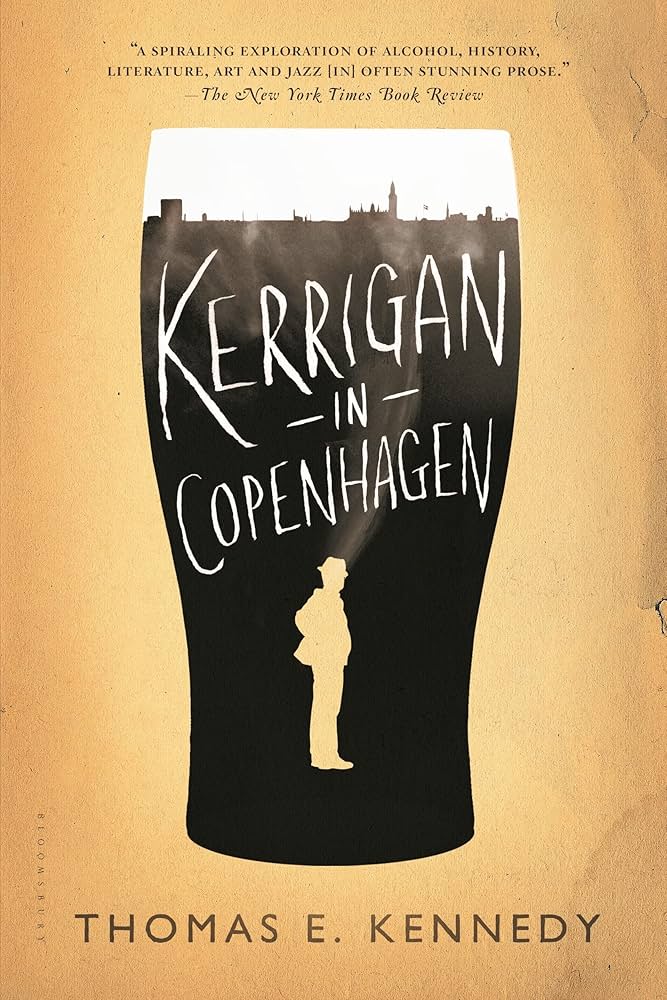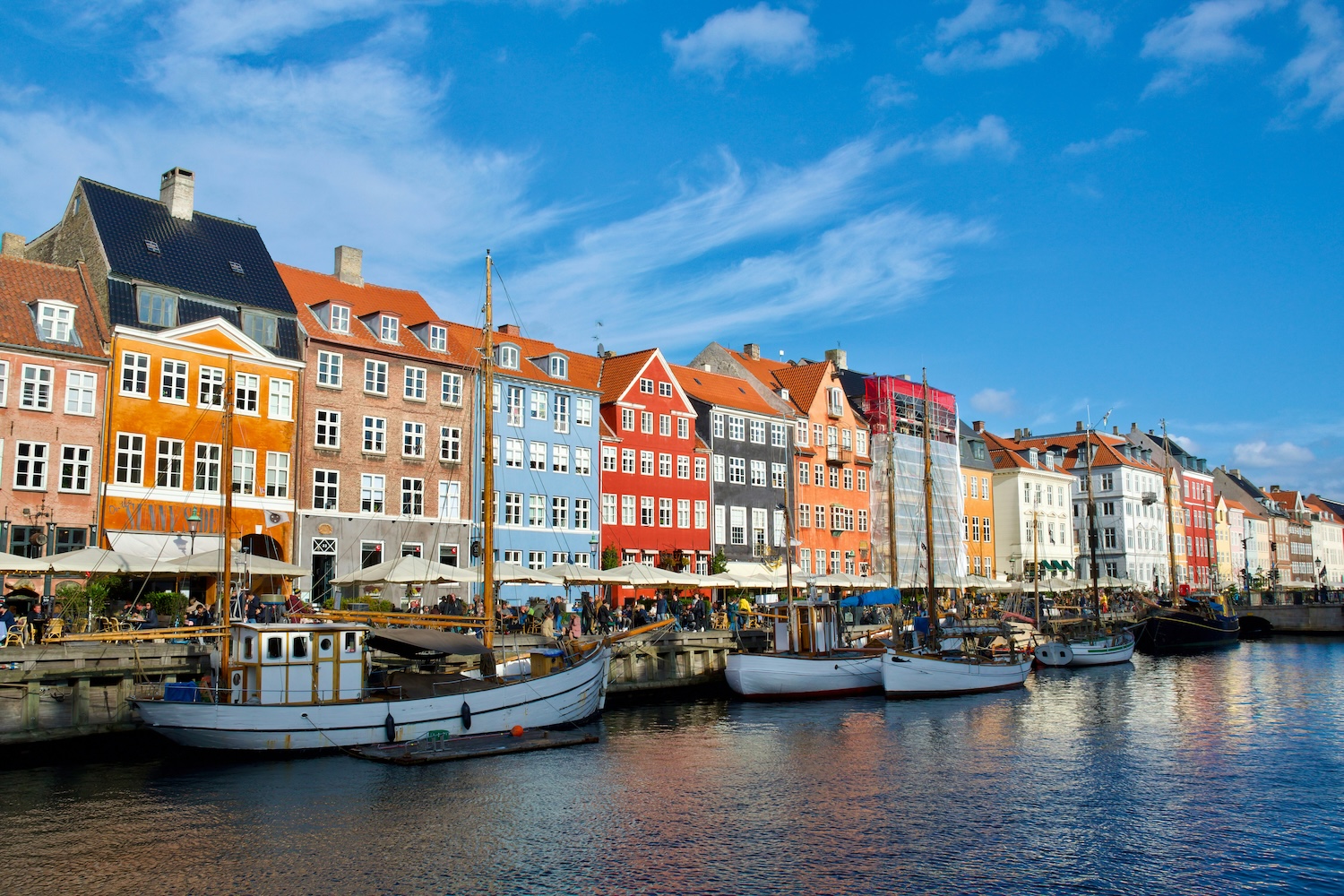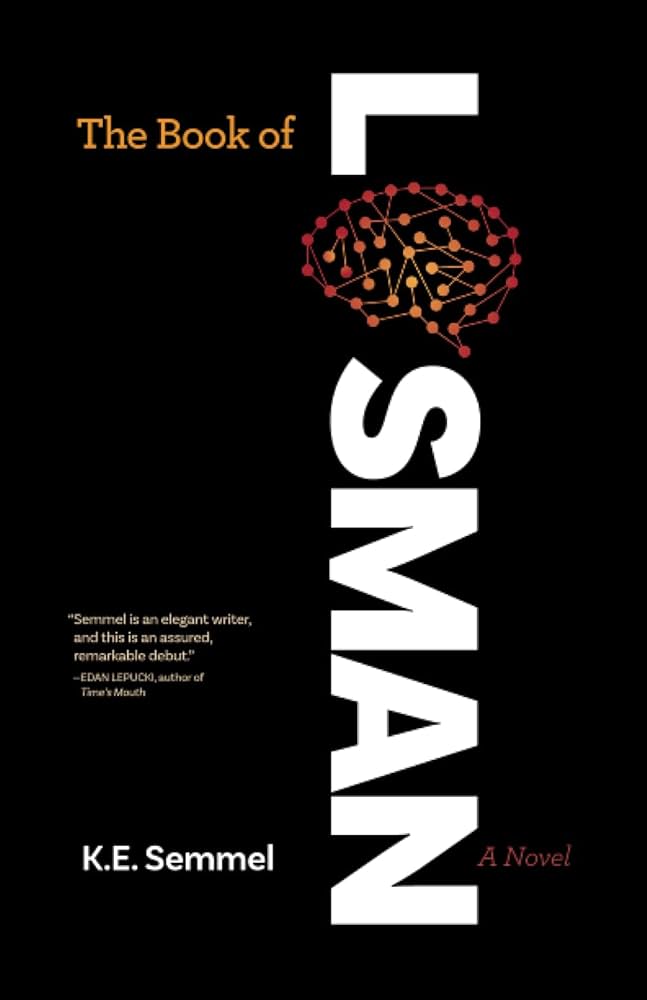As the political and cultural capital of Denmark, Copenhagen enjoys a vaulted status. Founded some 1,000 years ago by the Vikings, it has grown to become one of the most important cities in Europe. With its 650,000 + residents it is the second largest in Scandinavia, behind only Stockholm (when you include Greater Copenhagen in the population tally, the figure balloons to over 1.4 million). Like many majestic old cities, it’s a palimpsest. In 1728 and 1795 the city went up in flames, and it was bombed by the British in 1807 during the Battle of Copenhagen; after each conflagration it arose from the ashes like a Phoenix. Thanks to such rebirths, you can walk through nearly any section of Copenhagen and find myriad architectural styles. It’s a vibrant place, bright and colorful. One of the distinct features of the city can be found capped on its many buildings: green copper roofs that glint in the sunlight.
It’s very much a city of writers, too. Søren Kierkegaard comes to mind. His contemporary Hans Christian Andersen wasn’t born or raised here, but he certainly became famous in Copenhagen, as did one of Denmark’s most important 20th century poets: Inger Christensen. Karen Blixen spent much of her life living on her family’s estate just a few kilometers north of Copenhagen, in Rungsted. Today, scores of writers (and translators) call Copenhagen home, including, among many others, Pia Tafdrup, Christian Jungersen, and Olga Ravn.
After more than two decades of translating Danish novels and writing ultimately failed manuscripts, my debut, The Book of Losman, finally publishes this week (SFWP). It’s about a literary translator with Tourette Syndrome who gets involved in an experimental drug study in the hopes of finding a cure for his condition. The novel’s setting, Copenhagen, was purposeful. In addition to being an amazing city where a Danish translator can ply his trade, Copenhagen is also home to a number of pharmaceutical giants. The Book of Losman is fiction, but I liked the idea that scores of scientists are at work in Copenhagen.
In my reading list, I explore recent novels and memoirs set in Greater Copenhagen that reveal parts of the city you won’t find in any guidebook.
So Much for That Winter by Dorthe Nors; translated by Misha Hoekstra
By now, American readers surely recognize the name Dorthe Nors, the Man Booker International Prize-nominated author of Mirror, Shoulder, Signal (also translated by Hoekstra) and several other important books published by Graywolf. So Much for That Winter consists of two experimental novellas. The first, “Minna Needs Rehearsal Space,” explores the life of the eponymous protagonist, a down on her luck composer, via simple declarative sentences:
“Minna hasn’t been out of her apartment in three days.
Minna has sent a lot of texts
Minna has asked Lars to tell her what was supposed to be
In front of But.
Lars doesn’t reply.”
And so on. It’s a remarkable novella, one that proves you don’t need to pile on descriptions to build a compelling narrative. The second novella, “Days,” is built as a series of daily journal entries, lists. The narrator simply tells us what she did each day. The result is an arresting story that’s thematically linked to “Minna” in that it’s about a woman going through emotional turbulence. Both novellas are beautifully translated by Misha Hoekstra.
This Should be Written in Present Tense by Helle Helle; translated by Martin Aitken
Although Helle Helle is less a household name in the United States than Dorthe Nors, she’s a prolific, award-winning writer in Denmark with a singular vision. This Should be Written in Present Tense is about a young woman, Dorte, who lives in the southern Zealand railway town of Glumsø but is ostensibly a student in literature at the University of Copenhagen. Commuting back and forth between the two places, she is adrift, living a life she can’t quite settle into. Instead of going to classes, Dorte spends much of her time drinking coffee, riding the train, and having random sexual encounters. Helle Helle is a master of understatement. This Should be Written in Present Tense favors a narrative style in which the protagonist glides along passively. Things often seem to happen to her—though this never feels labored. As with her previous books, Helle Helle shines a subtle light on hidden ridges below the surface of her protagonist’s life. And with her clean, minimalist prose that keeps the reader at a slight emotional remove, as though viewing Dorte through a thin film, Helle’s style and register feel wholly original. It’s as though Dorte is a kind of Everywoman for the modern age. The translator is Martin Aitken, whose work is always top notch.

Kerrigan in Copenhagen by Thomas E. Kennedy
American Thomas E. Kennedy was a prolific writer and critic of more than 30 books. He was also a mainstay on the Copenhagen literary scene. Beginning in 2010 with the publication of In the Company of Angels and concluding with Beneath the Neon Egg in 2014, Kennedy finally received the broader recognition he deserved when Bloomsbury published his Copenhagen Quartet—four novels that read like a love song for Kennedy’s beloved adopted city, where he spent much of his adult life (he passed away in 2021). In the third novel of the quartet, middle-aged Kerrigan is a surly but lovable curmudgeon who’s writing a book: a guidebook to Copenhagen’s 1,525 serving houses (a term Kennedy employs in the novel to denote bars, taverns, and pubs; later, it even became the name of the publisher he co-founded, Serving House Books). Early in the novel, we learn that Kerrigan’s younger wife has left him and taken their daughter with her; we understand his desire to write this book is more about drinking (and numbing the pain of loss) than writing. But Kennedy doesn’t dwell in darkness. Like James Joyce’s Ulysses, Kerrigan in Copenhagen reads like a fine, comic (and literary) stroll through the recesses of a great European capital.
When Death Takes Something From You Give it Back: Carl’s Book by Naja Marie Aidt; translated by Denise Newman
When Death Takes Something From You Give It Back was longlisted for the National Book Award, and it’s easy to see why. With Aidt’s characteristic lyricism, which blends poetry and prose and literary allusions in startling and fresh ways—in an exemplary translation by Denise Newman—this book explores the harsh reality a mother and her family face when a child is suddenly taken from them. With a masterful use of repetition that periodically returns readers to key moments in the timeline of her son Carl’s death, Naja Marie Aidt pulls no punches here. This is a brutally vulnerable and honest book, engrossing and powerful. Though it’s not for the faint of heart, it is a book that reveals Aidt’s crushing sorrow—and rewards us, yes, rewards us—by dropping us deep into the great depths of her tragic experience and impelling us to feel, viscerally, our shared humanity. Nobody wants to experience such loss, such pain, not even second hand. But Naja Marie Aidt is an authoritative guide through the darkest hours of her life following Carl’s death. That loss may be the instigator of the story, but the overwhelming emotion one feels is Aidt’s unassailable love for her beautiful boy, whose life ended all too soon.
The Copenhagen Trilogy: Childhood; Youth; Dependency by Tove Ditlevsen; translated by Tiinna Nuunally and Michael Favala Goldman
Tove Ditlevsen was a prolific Danish poet and writer whose work is seeing a resurgence thanks to the 2021 publication of The Copenhagen Trilogy, which was recently ranked as #71 of the best books of the century by the New York Times. Ditlevsen’s life was, in many ways, a sorrowful one—as The Copenhagen Trilogy illustrates. In these three chronologically-arranged memoirs, Ditlevsen narrates the story of her life from her childhood until her mid-thirties, by which time she’d already been divorced three times. Born to working class parents in Copenhagen, her life was one of struggle and strife from the start, and throughout her career she mined her experiences to write books in multiple genres. The trilogy culminates in one of the very best memoirs I’ve ever read on the subject of addiction—from the point of view of a woman whose drug use was deliberately enabled by her mentally unstable third husband. The translation across the three books is seamless, with both Tiinna Nuunally (Childhood and Youth) and Michael Favala Goldman (Dependency) doing a fantastic job recreating Ditlevsen’s vivid voice in English. Ditlevsen’s oeuvre includes more than three dozen books, very few of which have been translated into English. Let’s hope that changes soon.
Civil Twilight by Simon Fruelund; translated by K.E. Semmel
Spuyten Duyvil reissued in August my translation of Simon Fruelund’s short novel Civil Twilight. This novel takes place entirely on a fictionalized suburban Copenhagen street, Dante’s Allé. Fans of Richard Linklater’s 1990 film Slacker will especially appreciate this novel. The narrative moves down the street, from house to house, character to character, giving readers brief glimpses into the many lives and families who live there. When it was originally published in Denmark in 2006, the book was a bestseller—a fact that may seem remarkable today since nothing much actually “happens” in the story, though associations are made between the many characters that turn the narrative into a kind of puzzle readers can piece together, a game of connect the dots. Simon Fruelund is a minimalist with a keen sense of humor, and even though it may seem that not much is happening, there’s a great deal of activity burbling underneath the surface. Perhaps ironically given the way Fruelund hops from character to character, Civil Twilight is one of those splice of life novels that reveals the rich social complexity of Danish culture in a globalized community.
Wild Geese by Soula Emmanuel
Soula Emmanuel’s Wild Geese is a terrific debut novel, and it won the 2024 Lambda Literary Award for best transgender fiction. Protagonist Phoebe is thirty years old and, like the author, hails from Dublin. She’s a PhD student in Lund, Sweden and living a solitary life across the sound in Copenhagen. She is trying to find her way in life, discover herself. Born and raised as a boy, Phoebe is three years into her gender transition. When Grace, an ex-girlfriend from her college days, appears at her apartment door in Copenhagen, it sets the stage for the formation of a tender, intricate, and compelling friendship that will develop over the course of the novel—one that includes a significant romantic evening when the two explore, awkwardly at first, their bodies. What begins as a novel about a lonely young woman fashioning a new life for herself in a foreign city becomes, instead, a novel about the intimacy of female relationships. Phoebe and Grace crack open the darkest parts of themselves and share these parts with the other. This is a novel deeply rooted in the coming-of-age tradition, even as it pries that tradition apart. Soula Emmanuel writes with verve, poise, and warmth, occasionally even flourishing a welcome and lively philosophical spirit.
Read the original article here

